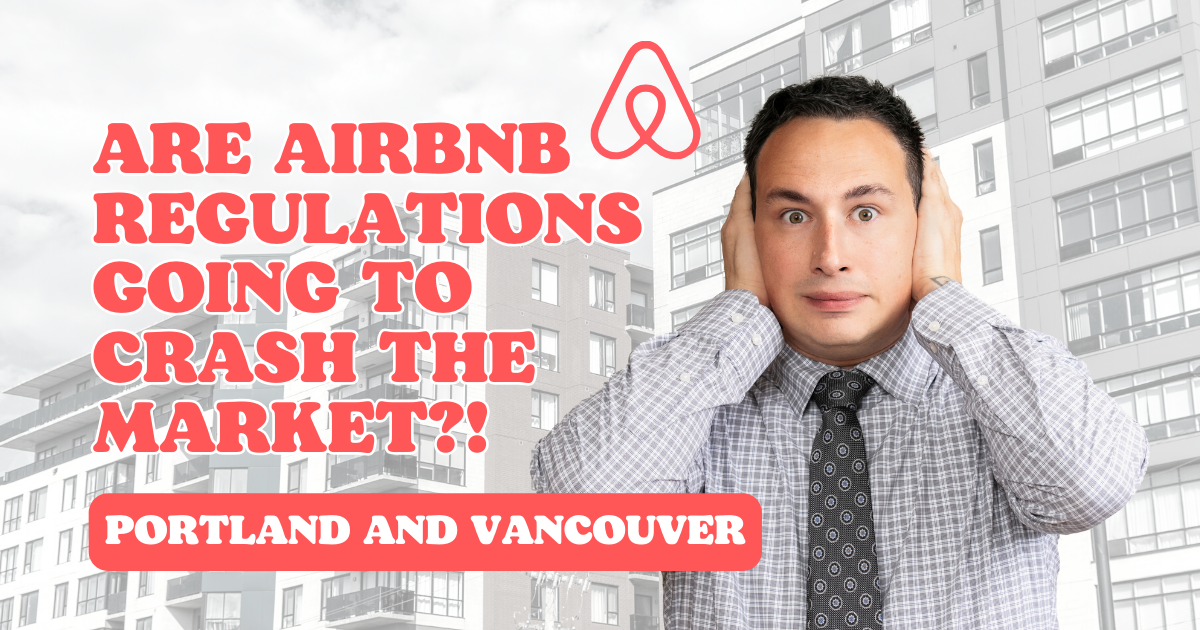In recent times, there has been a flurry of headlines and discussions surrounding the potential impact of Airbnb regulations on the housing market in cities like Portland and Vancouver. Some bold claims have been made, with comparisons to the 2008 market crash and fears of a housing market collapse. To shed light on this issue, we turn to Johnny and Angela from our team, who provide valuable insights into the situation in this week’s market update video. In this article, we’ll delve into the key takeaways from their conversation and examine the Airbnb landscape in the Pacific Northwest, including Portland and Vancouver.
The Changing Landscape of Airbnb
It begins by acknowledging the growing concerns about Airbnb regulations and their effects on the housing market. It’s important to note that there is a prevailing sentiment that Airbnb hosts might be facing tougher times due to increased regulations, rising costs, and more competition.
One critical development mentioned is New York City’s enforcement of a host registration law, which is designed to crack down on illegal short-term rentals. This move is particularly relevant in New York, a city with high tourism rates and a significant short-term rental market. The enforcement of such regulations could have a substantial impact on individuals who didn’t anticipate these changes when entering the Airbnb business.
The Changing Dynamics of Being an Airbnb Host
Let’s touch on the changing dynamics of being an Airbnb host. Over the years, the “romance” of hosting on Airbnb has worn off for some individuals, especially as regulations have tightened and operational costs have risen. Airbnb hosts must cover all utilities and other property-related expenses, which can significantly affect their profitability.
Moreover, competition among Airbnb hosts has intensified. Successful hosts have learned the ropes, from creating appealing property listings to providing exceptional guest experiences, while inexperienced hosts may find themselves struggling. This heightened competition can lead to a natural “weeding out” of less committed and less effective hosts.
Portland’s Experience with Airbnb Regulation
Next let’s dive into the specific case of Portland, where Airbnb regulations have been in place for several years. The city implemented measures similar to those currently being enforced in New York, requiring hosts to register and obtain permits. This led to a notable number of properties going on the market, although this coincided with the emergence of the COVID-19 pandemic.
During the pandemic, the demand for Airbnb rentals decreased significantly, as travelers sought more isolated and private accommodation options. Many hosts decided to exit the short-term rental market during this time, leading to a reduction in the number of Airbnb listings in Portland.
Airbnb’s Presence in Portland
Johnny and Angela highlight that, as of the video, there were around 3,300 Airbnb listings in the Portland area. Importantly, a significant portion of these listings were likely legal and operated by hosts with accessory dwelling units (ADUs) or basement apartments, complying with local regulations.
They argue that even if a portion of these listings were to cease operating as short-term rentals due to regulatory changes, it would not be enough to crash the housing market in Portland. In fact, they suggest that the housing market could welcome the transition of some of these properties into the long-term rental market, helping to alleviate the region’s ongoing housing shortage.
The Value of Short-Term Rentals
Johnny and Angela also emphasize the importance of short-term rentals, especially for traveling professionals such as nurses, who may require temporary housing solutions. The availability of short-term rentals, including those with a 30-day minimum stay requirement, is beneficial for both hosts and individuals in need of temporary accommodation.
Potential Impact on Vacation Communities
There is one crucial concern regarding vacation communities. Many people purchased vacation homes during the COVID-19 pandemic, and they might struggle to cover their high mortgages through long-term rentals due to low rental rates in certain areas. In such communities, the banning of short-term rentals could lead to a reduction in property values and force homeowners to sell.
Bottom Line: Don’t Believe the Hype
In conclusion, we hope to have provided you a thoughtful analysis of the potential impact of Airbnb regulations on the housing market in the Pacific Northwest, particularly in cities like Portland and Vancouver. We believe these insights dispel the notion that the housing market would crash due to the enforcement of such regulations, highlighting that these changes are unlikely to have a substantial negative effect.
While there may be challenges and adjustments for Airbnb hosts, the housing market remains resilient. It’s essential to separate fact from fiction and not succumb to sensationalist headlines. Aspiring homeowners should focus on finding properties that meet their needs and financial capabilities, rather than hoping for a dramatic shift caused by Airbnb regulation. In the end, a balanced approach to housing regulation is crucial to ensure the stability and availability of housing options in these vibrant Pacific Northwest cities.

